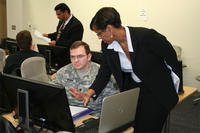Working remotely is nothing new to military spouses.
They’ve been doing it successfully for years, sometimes as a virtual assistant. But what exactly is that?
Small Business Trends defines a virtual assistant, or VA, as "an independent worker who assists with administrative, business development, social media, marketing or other tasks." Working as an independent contractor from home means VAs can dictate their schedules and how many hours they work.
What does a virtual assistant typically do? The answer varies depending on the industry and client, but overall they take care of administrative tasks like scheduling appointments, answering emails and some VAs also create online course content. There’s no universal training or certificates, but some programs help you hone skills and find clients. As with gig economy jobs, the hourly pay will range from client to client, and job to job, but the average is $16 an hour, according to Payscale.
Sounds great, right? It can be. Here are five reasons that military spouses should consider becoming a virtual assistant and how they can go about doing it.
It’s flexible
When Army wife Delilah Wieman first looked at becoming a virtual assistant, she was attracted to the flexibility. She loved doing administrative work but couldn’t devote 40 hours a week to the office while fulfilling her responsibilities as a wife and a sometimes-solo parent.
"They aren't babies anymore," Wieman said of her five children, the youngest of whom is 17.
With her husband on an unaccompanied tour, Wieman needed to be available.
"I quickly realized that I was not in a position to be able to do what would be a normal, regular, everyday job. And I actually started Googling," Wieman said. "I didn't even know virtual assistants were a thing."
But after putting together her resume, she found a position with BELAY, a company that helped match her skills with her clients’ needs.
It’s portable -- for real
Many military spouses struggle with jobs that say they are portable but aren't really. Some jobs require licenses in each state or special certification. But for virtual assistants, that isn't the case. Wieman hasn't moved -- yet -- with her position, but she has traveled with it successfully.
"I moved one daughter home from college, and another one out to college,’’ Wieman said. “I went to take care of my mom while she was ill.’’
And she'll experience a permanent change of station this summer when her husband returns from his tour and they move to Fort Hood, Texas.
You can specialize
While there are tasks that VAs commonly do, there is plenty of room for specialization, both with the types of clients and tasks. For Air Force wife Kirstin Navaroli, this was key. She met her husband right after finishing her master's in clinical psychology and was looking forward to a career when she moved to Joint Base Lewis-McChord and later to Laughlin Air Force Base, Texas.
"I do administrative-type customer support work for one client and do digital business management (and) operations management for another client," Navaroli said.
VAs manage email accounts and calendars, make appointments and run social media. It depends on your skills, training and interests. One of Navaroli's clients is a psychological assessment company, which was a perfect fit.
"I was strategically picking out things in that field, because I knew I still wanted to access that passion,’’ she said. “I went and got that degree for a reason. I'm not ready just to throw in the towel, and I wanted to still spark that part of my brain.’’
There’s room for growth
One of the best parts about being a VA is growing your business on your terms. You can specialize as Navaroli did, have flexibility and portability like Wieman does and you can grow. Wieman and Navaroli found programs to help them achieve career success. Wieman has felt supported by BELAY, both in finding clients and in the other VAs.
Navaroli feels the same way about her training with 90 Day VA, a program run by military spouse Esther Inman.
"She stuck with me the most because it didn't feel too commercial,’’ Navaroli said. “She was authentic and raw with her story. That layer of vulnerability from her resonated with me a lot, because it's something as a military spouse I can empathize with. You have to make really tough decisions every day for your family.’’
There's a community available
Military spouses work hard to develop and grow professional and personal networks, and Wieman and Navaroli have benefited from that. Wieman trusts BELAY to have her best interests at heart and to support her through rough times, such as when her mother died earlier this year.
"I actually just sent BELAY a message and just said, 'I don't know what to do, but I know I'm not going to be able to work my hours in January,’’’ Wieman said. “I think I can get back on Feb. 1 and be back to work.’’
BELAY supported her through condolence emails and said, "You know what? Don't worry about January. Let's talk at the end of January and make sure we can get February."
Wieman found that so genuine and unexpected from a company.
Keep Up with the Ins and Outs of Military Life
For the latest military news and tips on military family benefits and more, subscribe to Military.com and have the information you need delivered directly to your inbox.























